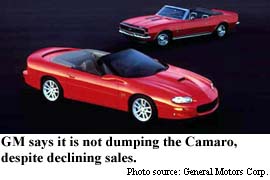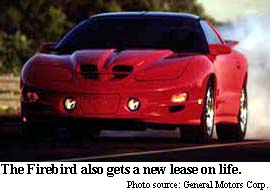|
GM keeps Camaro, Firebird
|
 |
November 12, 1999: 4:39 p.m. ET
GM denies report that it is dropping sports coupes in face of declining sales
By Staff Writer Chris Isidore
|
NEW YORK (CNNfn) - General Motors Corp. refuted reports Friday that it is set to stop making the Camaro and Firebird models, saying it is committed to the sports coupes through at least the 2002 model year.
"While as a policy General Motors Corp. does not publicly discuss its long-term future product plans, recent reports of the Chevrolet Camaro and Pontiac Firebird's pending demise are inaccurate," the company said Friday afternoon in a statement.
The statement followed a story in the Friday Oakland, Mich., Press that said the world's largest automaker would stop making the cars due to declining sales.
The company has committed to the Canadian Auto Workers that it will keep the plant in the Montreal suburb of Ste. Therese, Quebec, open at least through September 2002, the company said. The plant has about 1,200 employees making nothing but the two models, along with the Trans Am version of the Firebird.
"At this time, no product has been assigned to the plant after that date, but GM continues to study possible options," the statement said. "Nothing has changed concerning GM's production plans for the Camaro and Firebird. In fact, special editions of the Camaro and Firebird are in development for the 2002 model year."

Through the first 10 months of the year, sales of the Camaro are off 16 percent, according to GM, down to 35,212. Firebird sales are up 6 percent from the year-ago period to 29,175. But the Canadian plant that produces the two vehicles has been on only one shift a day since 1995, and is likely to make about 83,000 of the two vehicles this year, compared to a high point of 192,000 in 1994.
Analysts say it would make sense for GM to halt production of the cars, at least temporarily, and then bring them back with a major redesign a few years later on a platform that it could share with other models.
"Generally the product is a low volume product, very engineering intensive, so it's expensive to make," said Rod Lache, analyst at Deutsche Banc Alex. Brown. "GM has too much car capacity and not enough truck capacity. Car plants are operating close to 70 percent capacity, while truck plants are close to 100 percent. You can use that manufacturing plant, maybe for a hybrid sports utility vehicle/car."

Still, Lache said even if its GM did stop production of the two models, "it's not a stock moving event."
Despite declining sales, the models have thousands of loyal enthusiasts. There are hundreds of Web sites devoted to Camaros, for example.
"I hope it never dies. I think the new Camaro is one of the best performance values you can buy," said Danny Deutsch, 23, a computer technology student at Marshall University in Huntington, W.Va. But despite his enthusiasm for the model, he worries about the constant rumors that the car is near the end of its line.
"I think the SUVs trend has taken over," he said.
But Lache disagrees with the enthusiasts. He says the current models are a pale imitation of the break-through cars of earlier years.
"It's had so much plastic surgery, it's not even recognizable any more," he said. "I could put a Corolla out there tomorrow and call it a Camaro, it's not going to make it a better car."
|
|
|
|
|
 |

|

